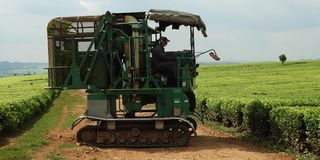Farm invasions and torched machines: Tea politics descends into ugliness in South Rift

A tea plucking machine at Eketera tea estate in Kericho on June 30, 2022. Pressure is mounting on multinationals in the South Rift region to discard the use of such machines in favour of manual plucking.
Police have beefed up security around the operations of multinational tea companies in the South Rift region following attacks by groups of youth. On Thursday, 35 youths had engaged police in running battles in tea estates owned by Ekaterra Plc, formerly Unilever Tea, in Konoin constituency, Bomet County.
It came hot on the heels of the torching of 10 tea plucking machines at the Tagabi estate owned by the same company in Belgut constituency two weeks ago.
Kericho Governor Erick Mutai was unrepentant, saying the companies must cede their ground to the demands or quit operations in the region altogether.
Bomet County Commissioner Ahmed Omar called for sobriety among politicians on the matter.
"The youths were illegally harvesting tea in the estates when the police arrested them. They stoned the police and the company's private guards in a very unfortunate incident," Dr Omar said.
He added: "The problem in Konoin constituency is getting worse and there is a need to have a dialogue with the various stakeholders to end the stalemate."
He said that criminal activities would not be allowed and warned the youth to keep away from tea farms.
Dr Mutai has threatened to petition the National Land Commission (NLC) to reverse leases that Kenya entered with multinationals in the South Rift.
He claimed some multinationals had threatened to relocate to Rwanda.
"You [companies] can leave for Rwanda as you threatened," said Dr Mutai
"The companies are not employing locals while they are posting huge profits with mechanised operations in their estates."
Nandi Governor Stephen Sang and his Bomet counterpart Hillary Barchok want a quick solution to the stalemate.
Ms Florence Bore, the Labour and Social Protection Cabinet Secretary-nominee, said she would address the matter if approved by Parliament.
"We need a stakeholders’ meeting to thrash out the issues and have a win-win situation," said Ms Bore.
Mr Simeon Chelugui, the Cabinet Secretary for Labour, has said the government would not fight mechanised harvesting of tea.
"This is a global phenomenon, but the multinationals will be prevailed upon to protect workers' rights," he said.
Resident Patrick Kettienya said: "It is sad leaders pushing for a revolution are an educated elite in the society who are well aware of the import of their action in regards to stability in investments.
"How can leaders – especially governors - scare away existing investors on one hand and on the other call upon potential investors to set up camp in the affected counties?
“Is that practical? What is this hidden agenda on the push to reverse mechanisation? [The pushback] is not economical nor practical?"
Mr Kipyegon Korir, another resident, said the demands from the political class were against President William Ruto's push to attract and protect investors in Kenya.
"How will the national and county governments pitch for more investments in the country when the governors are seeking to create a similar situation with the one that prevailed in Zimbabwe, where white settlers were kicked out of their farms and the properties taken over by locals?" Mr Yegon said.
Ms Beatrice Mutai, a youth leader, urged the President to intervene and stop governors from making alarming statements.
"When Dr Ruto is working hard to revive the battered economy, his foot soldiers are scaring away investors," Ms Mutai said.





